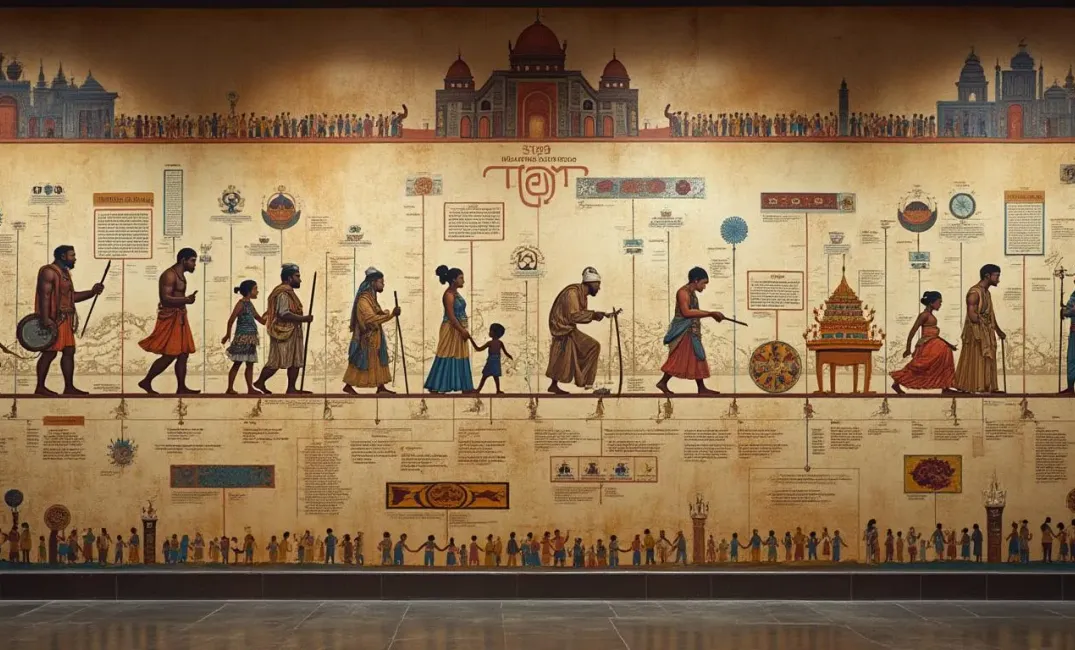Introduction: Governing Humanity Across Time
"The art of governing consists in not letting men grow old in power." — Napoléon Bonaparte
Human governance has transformed significantly throughout history, evolving from local leadership within small tribes to the complex organizational structures of modern nation-states. This exploration delves into the myriad forms of governance that have emerged over centuries, examining their roles in shaping societies, cultures, and political landscapes. As we journey from the earliest tribal hierarchies to contemporary global governance, we reflect on the legacies and lessons these systems offer for humanity's future.
Tribal Beginnings: The Genesis of Governance
Ancestral Leadership
- Kinship-Based Rule: Early forms of governance relied heavily on familial ties and kinship. Tribal leaders, often the eldest or most respected members, made decisions through consensus, ensuring survival and cohesion.
- Oral Law and Tradition: Governance was underpinned by oral traditions and customs, where societal norms and values were passed down through generations, preserving cultural identity and community bonds.
Hunter-Gatherer Societies
- Consensus Building: Decision-making processes were collective, ensuring that decisions reflected the tribe's needs and values. Egalitarian principles often guided governance, valuing consensus over hierarchy.
- Distribution of Resources: Fair distribution of resources was crucial. Governance systems focused on ensuring equitable access to sustenance and tools, maintaining social harmony and collective responsibility.
The Rise of City-States and Kingdoms
Early City-States
- Structured Hierarchies: City-states like those in Mesopotamia introduced structured hierarchies with organized governance, featuring councils and centralized decision-making bodies.
- Codified Laws: Codification of laws, such as Hammurabi's Code in Babylon, established written norms and consequences, providing a foundation for modern legal systems and promoting justice and order.
Monarchies and Dynasties
- Divine Right and Authority: Monarchies often justified rule through divine authority, aligning rulers with deities to consolidate power and bolster legitimacy.
- Administrative Bureaucracy: Dynasties in regions like ancient China implemented bureaucratic administrations, enhancing governance efficiency and facilitating large-scale resource management and infrastructure development.
The Emergence of Republics and Democracies
Classical Antiquity
- Athenian Democracy: Athens pioneered democracy, a radical governance experiment where citizens actively participated in decision-making, shaping the civic landscape and elevating public discourse.
- Roman Republic: Rome's republican model incorporated checks and balances through the Senate, magistracies, and popular assemblies, blending aristocratic and democratic elements.
Enlightenment and Revolutionary Ideals
- Philosophical Underpinnings: Enlightenment thinkers like John Locke and Jean-Jacques Rousseau reshaped governance philosophies, championing individual rights, social contracts, and limited government power.
- Revolutionary Impact: Revolutions in America and France reflected Enlightenment principles, overthrowing monarchies and establishing governance based on liberty, equality, and fraternity, influencing global political paradigms.
Nation-States and Modern Governance
Industrialization and Nation-Building
- Nation-State Formation: The 19th century witnessed the proliferation of nation-states, driven by industrial revolution advancements, nationalist movements, and demand for centralized governance.
- Constitutional Frameworks: Legal documents, such as the U.S. Constitution, enshrined governance principles, ensuring the separation of powers, civil rights, and a framework adaptable to societal transformations.
Globalization and Supranational Entities
- United Nations and Global Governance: Post-World War II, the establishment of the United Nations and other international institutions facilitated global cooperation, peacekeeping, and collective responses to transnational challenges.
- Economic Unions and Agreements: Entities like the European Union exemplify regional integration efforts, promoting economic collaboration and collective governance to enhance stability and prosperity.
The Future of Governance: Challenges and Innovations
Technological Advancement and E-Governance
- Digital Democracy: Technology revolutionizes participation and transparency. Digital platforms offer citizens direct interaction with policymakers, fostering democratic engagement and accountability.
- Cybersecurity: As governance increasingly relies on technology, ensuring cybersecurity and protecting sensitive data is paramount to maintaining trust and security.
Decentralization and Grassroots Movements
- Local Autonomy: Decentralization trends empower local communities, enabling tailored responses to unique challenges and enhancing local governance effectiveness.
- Grassroots Advocacy: Social movements increasingly leverage digital tools to mobilize support, advocate for rights, and hold governments accountable, reshaping political landscapes.
Global Cooperation and Sustainable Development
- Transnational Collaboration: Addressing global issues like climate change and pandemics requires concerted international efforts and adaptable governance frameworks.
- Sustainability in Policy: Future governance must prioritize sustainability, integrating environmental consciousness into policy-making to ensure long-term ecological balance and resource viability.
Conclusion: Shaping Tomorrow's Governance Landscape
"What you do today can improve all your tomorrows." — Ralph Marston
Governance, in its myriad forms, is fundamental to humanity's progress, shaping civilizations and reflecting societal values. As we journey into uncharted realms and encounter unprecedented challenges, the evolution of governance remains a testament to humanity's capacity for adaptation and innovation.
The legacy of governance systems—from tribal councils to global networks—offers guidance as we strive for equitable, transparent, and resilient structures. Embracing diversity, nurturing inclusivity, and fostering collective resilience will enable societies to navigate future landscapes, aspiring toward peace, prosperity, and sustainability.
As trustees of civilization, humanity must continually refine its governance methods, cognizant of history's lessons and inspired by the potential to transform challenges into opportunities. Through patient dialogue, visionary leadership, and unwavering commitment to common well-being, governance will illuminate paths toward a more just and harmonious world—a legacy to empower generations yet to come.
GOVERNANCE, NATION-STATES, TRIBES, SUSTAINABILITY, DEMOCRACY, HISTORY, TECHNOLOGY, LEADERSHIP, GLOBAL COOPERATION

